Paris-Saclay, a pool of highly qualified talents
Paris-Saclay is the third-largest employer in France for engineering and managerial staff. With its exceptional concentration of higher education institutions, research laboratories, high-tech industries, engineering firms, and approximately 106,000 private sector executives and engineers, Paris-Saclay is a major employment hub with an extremely skilled workforce. It is the third-largest executive employment pool after central Paris/La Défense and Lyon. It benefits from positive economic trends and the cluster’s positioning in R&D, as well as its high-value-added sectors.
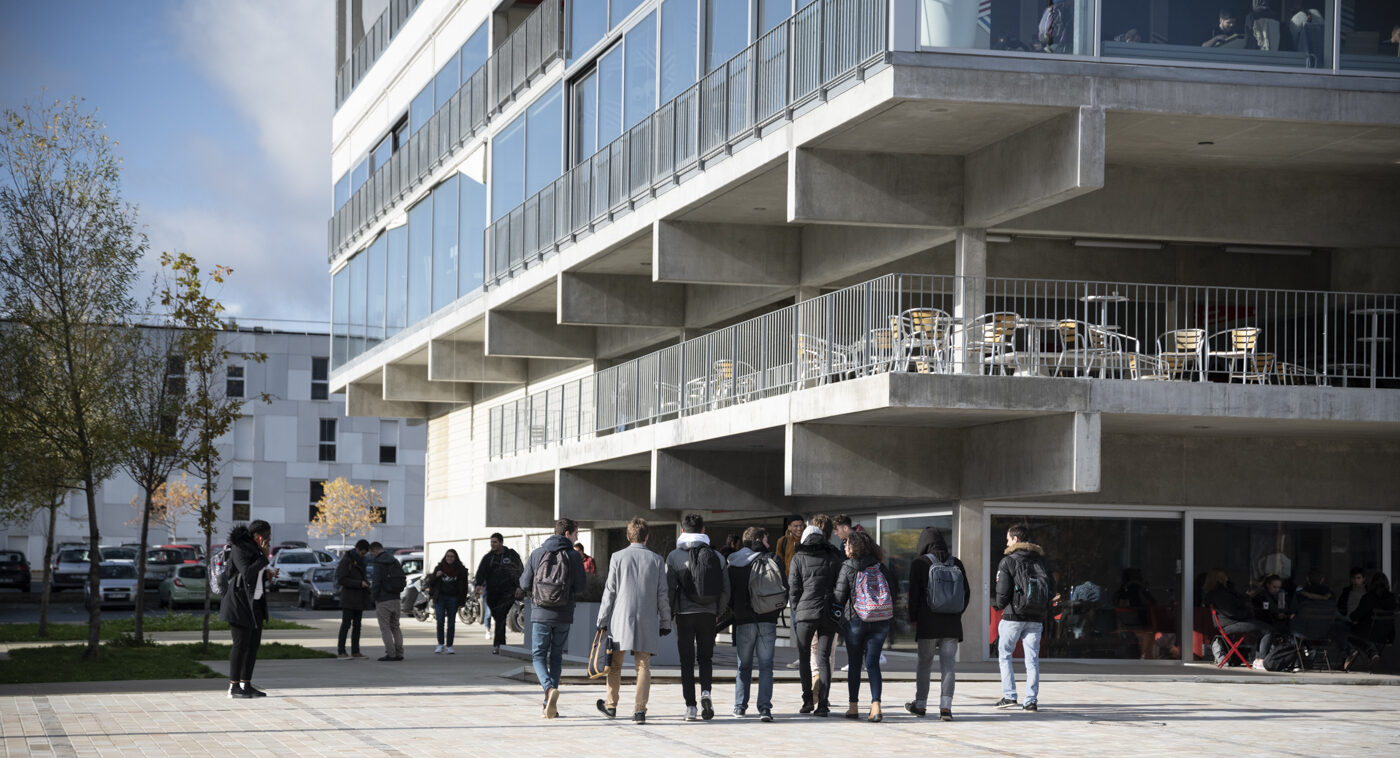
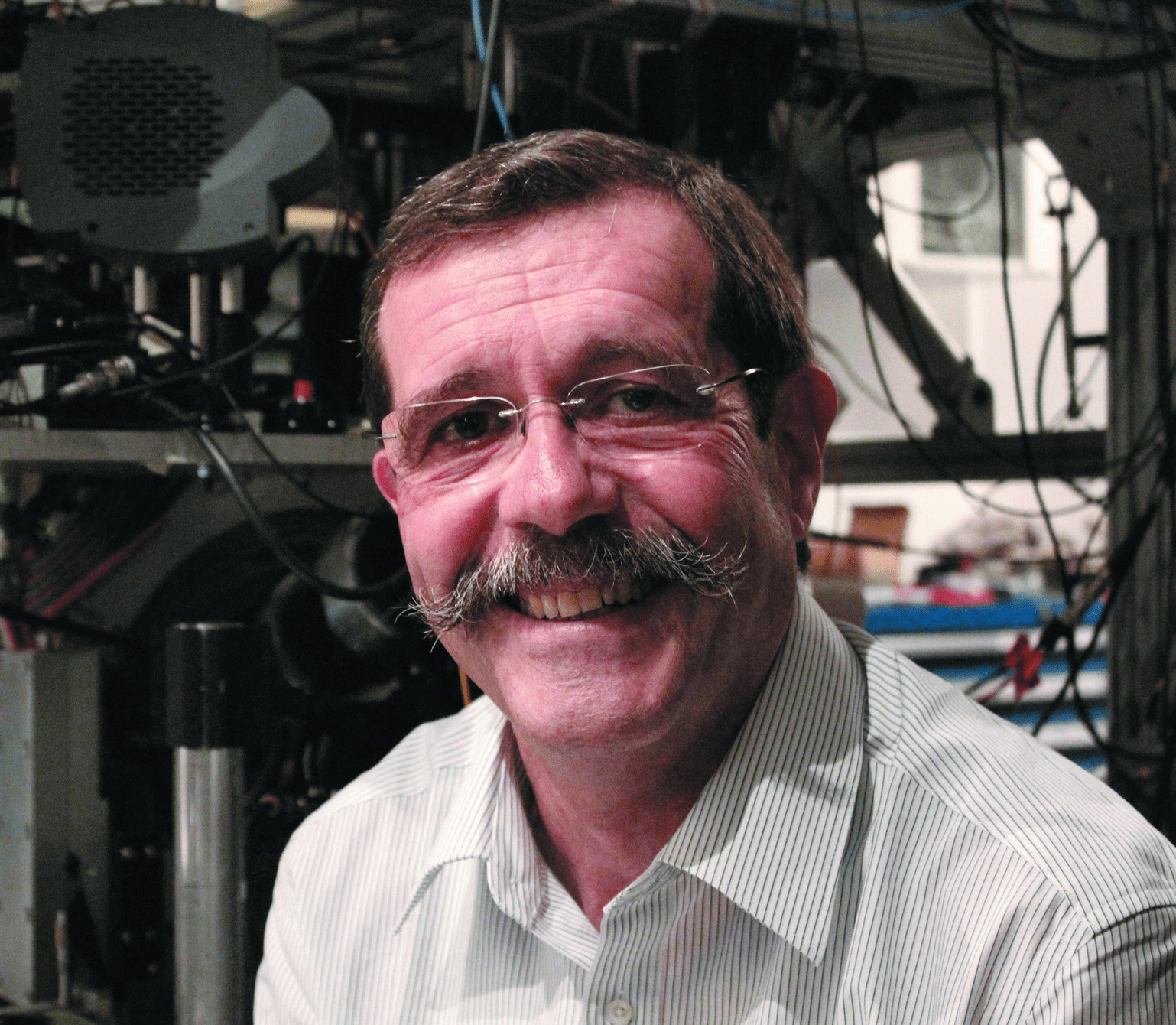
Alain Aspect, a Quantum Nobel
Born in 1947 in Agen, Alain Aspect is a “made in Paris-Saclay” Nobel laureate in physics. Currently an emeritus research director at CNRS, where he was awarded the Gold Medal in 2005, he earned his doctorate at the Institute of Optics in Orsay before spending most of his career at the laboratories of ENS Paris-Saclay and SupOptique. He continues to share his knowledge by teaching at the Institut Polytechnique de Paris and the Institut d’Optique Graduate School, where he holds the Augustin Fresnel Chair. Always at the forefront of quantum physics research, in 2019, he co-founded Pasqal, a startup specializing in quantum computers and systems, in Massy. This is a subject he knows well, as he was awarded the Nobel Prize in 2022, along with Jean Clauser and Anton Zeilinger, for his revolutionary and pioneering experiments on Bell’s inequalities and quantum entanglement, paving the way for quantum computing and cryptography. A member of numerous science academies worldwide, he has also received the Wolf Prize in Physics in 2010, the Balzan Prize in quantum computing in 2013, the Niels Bohr Gold Medal, as well as the Albert Einstein Medal and the Ives Medal from the Optical Society of America, all in the same year.
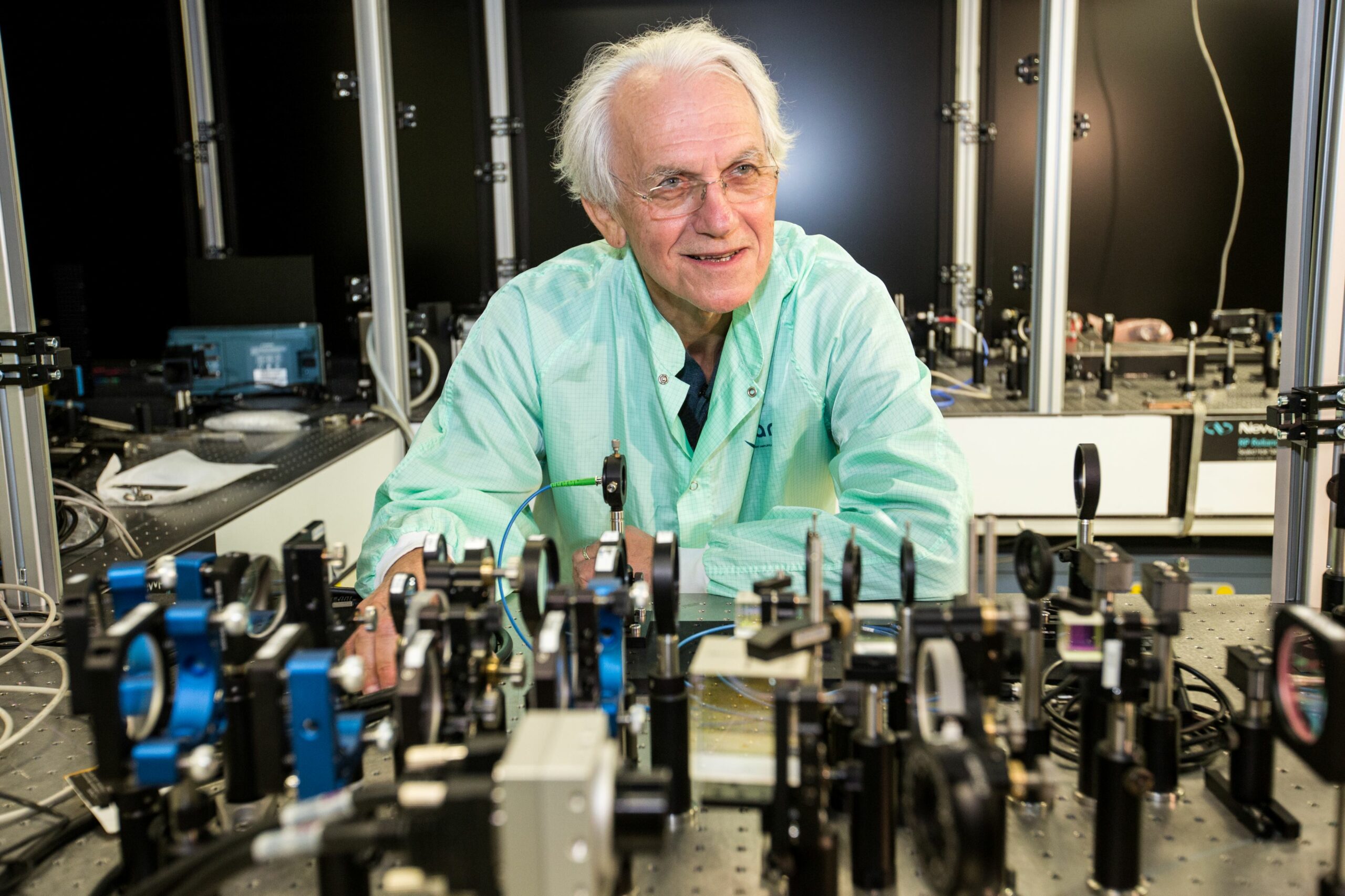
Gérard Mourou, Nobel Prize in Physics
After spending much of his career in the United States, particularly at the University of Michigan, Gérard Mourou returned to France in 2005 to lead the Applied Optics Laboratory shared by the National Higher School of Advanced Techniques (ENSTA ParisTech), CNRS, and École Polytechnique. He initiated two major initiatives in high-power lasers in the region: the launch of the XCAN demonstrator at École Polytechnique and, in 2007, the creation of the Institute of Extreme Light (ILE), aimed at constructing, on the Saclay plateau, the first 10-petawatt femtosecond laser named Apollon. In 2018, he was awarded the Nobel Prize in Physics along with Canadian Donna Strickland and American Arthur Ashkin for their method of generating high-intensity ultra-short optical pulses (Chirped Pulse Amplification technique), whose applications in the medical field, particularly in refractive eye surgery, myopia treatment, cataract surgery, or brain tumor treatment, are widely recognized today.
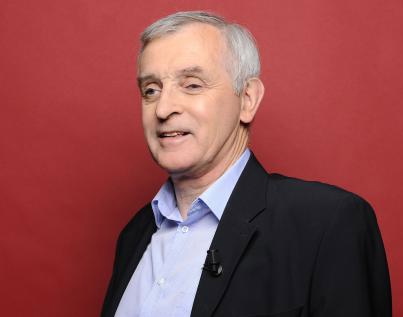
Jean Jouzel, Nobel Prize laureate and world leader in climate research
Renowned climatologist, Jean Jouzel began his career at the French Alternative Energies and Atomic Energy Commission (CEA). His early success came with the Vostok project, which led to the discovery of a 200-meter ice layer beneath Antarctica’s subglacial Lake Vostok. Building on this achievement and the Grip drilling program, Jouzel initiated the Epica program, directing it from 1995 to 2001. Concurrently, he held various roles at the CEA and the French National Center for Scientific Research (CNRS), including director of the climate and environmental modeling laboratory and head of the climate group at the Laboratoire des Sciences du Climat et de l’Environnement (LSCE) within the CEA. From 2001 to 2008, he served as director of the Institut Pierre-Simon Laplace, a federation of eight laboratories addressing climate-related issues within the Paris-Saclay hub. Jouzel joined the Intergovernmental Panel on Climate Change (IPCC) in 1994, serving as vice-chair of its scientific council from 2002 to 2015. In 2002, he was awarded the CNRS Gold Medal, the highest scientific research honor in France, jointly with Claude Lorius. He shared the 2007 Nobel Peace Prize with the IPCC and received the Vetlesen Prize in 2012, often dubbed the Nobel Prize of Earth and Space Sciences. Additionally, he is one of the most cited authors in the field of Earth sciences.
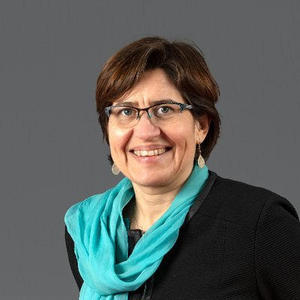
Valérie Masson-Delmotte, high representative of the IPCC
Climatologist, graduate of the École Centrale Paris in fluid dynamics and transfers physics, and research director at the Laboratory for Climate Sciences and the Environment (LSCE) within the CEA, Valérie Masson-Delmotte, who started alongside Jean Jouzel, focuses her research on climate change, particularly the evolution of past climates and the impact of future climate. A member of the Intergovernmental Panel on Climate Change (IPCC), she has been co-chair of Working Group I since 2015, focusing on the physical science basis of climate change. In 2018, she was listed by the renowned scientific journal Nature among the ten most influential figures of the year. In 2019, she was awarded the Silver Medal by the CNRS. She is also a member of the High Council for Climate, under the responsibility of the French Prime Minister.
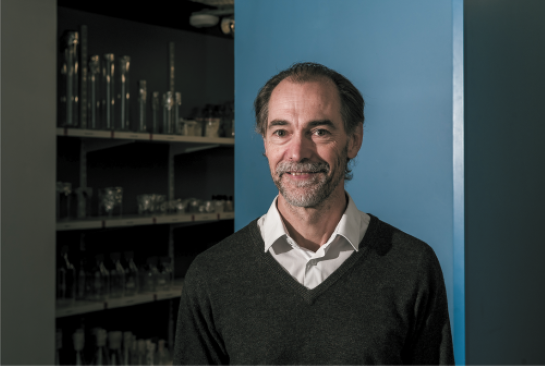
Joël Doré, a world leader in microbiota research.
Having arrived at INRAE more than thirty years ago after completing a doctorate at the University of Illinois (USA), Joël Doré is now a world specialist in food and gut microbiology. As a researcher at the Micalis Institute, research director at INRAE, and scientific director of the MetaGenoPolis center of excellence, he has notably discovered connections between the gut microbiota and certain chronic, neurodegenerative, or neuropsychiatric diseases, including autism. These discoveries have been applied in various diagnostic and therapeutic applications, leading to the co-founding of several startups, including Enterome, Maat Pharma, and NovoBiome.
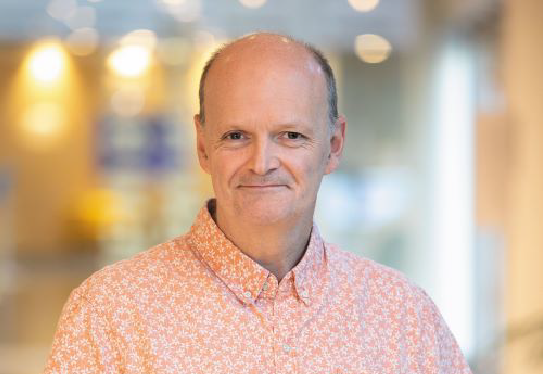
Luc Julia: Back to basics for the founder of Siri
Engineer and computer scientist, Luc Julia is primarily known to the general public for co-inventing the voice assistant Siri. He holds a PhD in computer science from Télécom Paris. Based in the United States since the early 1990s and a pioneer among pioneers, he is one of the founders of Nuance Communications, established in 1994, now a global leader in voice recognition. After the launch of the project that would become Siri, he founded the Computer Human Interaction Center (CHIC) in 1998, a laboratory specializing in artificial intelligence that developed the first connected objects or smart cars for BMW. In 2000, he founded a startup, Orb, specializing in transforming computers into multimedia servers, before spending nearly ten years with the Samsung group. He joined the Renault group in May 2021 as Chief Scientific Officer. A return to his roots for someone who was educated at ParisSaclay. He and his teams created Reno, the avatar that will be integrated into the new R5. Luc Julia is a member of the French Academy of Technologies. Author of several books, he is often referred to by the media as the “pope” of predictive artificial intelligence.
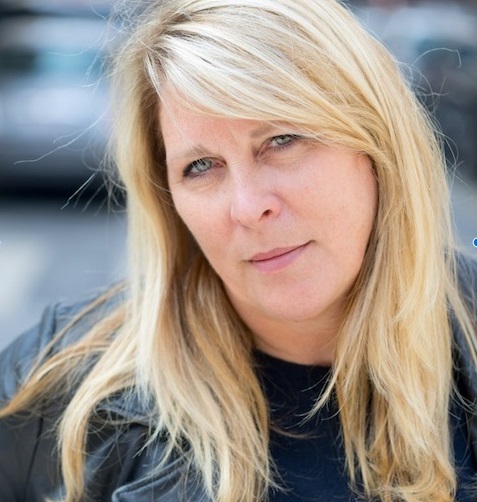
Laurence Devillers: Harmonizing AI with Ethics
Laurence Devillers, Professor of AI at Sorbonne University, is a researcher at the CNRS within the Interdisciplinary Laboratory of Digital Sciences (LISN) at the University of Paris-Saclay where she is responsible for the CHAIR outside 3IA HUMAAINE: HUman-MAchine Affective INteraction & Ethics. A founding member of the DATAIA Institute, his areas of research mainly focus on human-machine interaction, emotion detection, oral dialogue and affective and interactive robotics. She has written more than 200 international publications (Google Scholar: Hindex: 44) and participated in several national projects including ANR Tecsan Armen, FUI Romeo, BPI Romeo2, and international ones such as Rex Humaine, ANR Japon/Germany/France LeCycl and the project Eureka Buddy BeWell. She is also president of the Blaise Pascal Foundation for scientific mediation in mathematics and computer science. Finally, she participated in the National Pilot Committee for Digital and AI Ethics from 2019 to2024 and was responsible at AFNOR for the JTC21 (IA) working group on “Foundational and societal impacts of AI”. She has written several essays: Of robots and men (Plon 2017), Emotional robots (2020) and co-wrote with Serge Abiteboul and Gilles Dowek a play on attachment to chatbots: “Who hacked Garoutzia? ” produced in Avignon in 2023 and performed in Paris on the Parisian stage until the end of 2024.